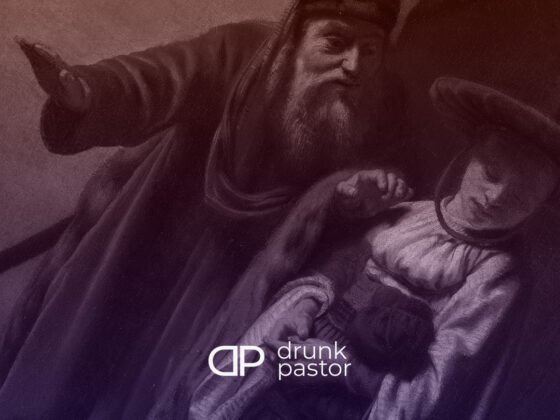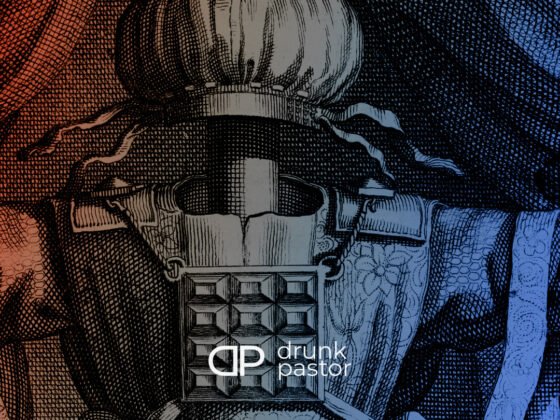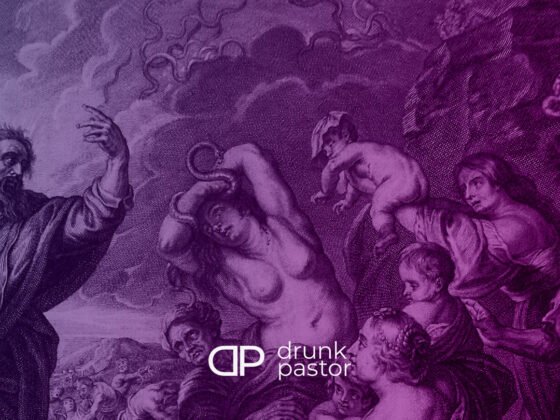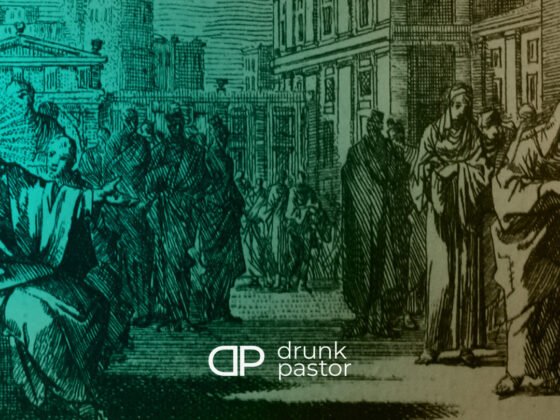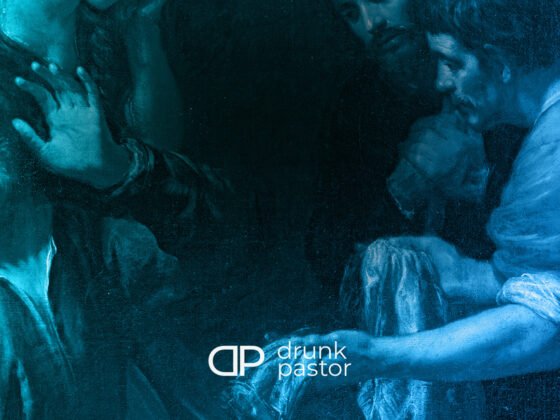God’s intervention in history and life is not necessarily through frequent, direct, or dramatic means but rather almost like He stitches and weaves a thread with a few pregnant moments when He reaches in. It is because He writes a redemptive narrative through the almost unnoticeable peculiarities that peculiarities are to be found on every page of Scripture. One of my most appreciated aspects of the Biblical canon is that it is real and messy while still carefully interconnected. That alone could potentially be an intentional declaration made by Scripture of a benevolent metanarrative we all move within. Perhaps it is. A similar description of God’s general modus operandi can be found in Paul’s Mars Hill sermon, “he made from one man every nation of mankind to live on all the face of the earth, having determined allotted periods and the boundaries of their dwelling place, that they should seek God, and perhaps feel their way toward him and find him. Yet he is actually not far from each one of us, for ‘In him we live and move and have our being’…” (Acts 17:26-28).
God makes it clear in Isaiah 55:8-9 that we are not capable of understanding His ways and that our preferred and assumed methods for intervention are not His:
“For my thoughts are not your thoughts, neither are your ways my ways, declares the Lord.For as the heavens are higher than the earth, so are my ways higher than your ways and my thoughts than your thoughts.”
Much of the Bible is humankind dealing with what they don’t know: Will they survive the coming army? Why are they starving? Is God punishing them? Has gotten forgotten me because of my empty womb? How do I find forgiveness and healing? How do we fix this mess we made? Every religion and worldview is trying to figure out the unknown aspects of what it means to be human. Every one. You, reader, have a worldview, a view through which you see and understand the existence you find yourself in. You may even assume it is a biblical Worldview. A harder truth is that you may not be aware of what your actual worldview is, especially, in my opinion, if you claim your worldview to be a Christian one.

You see, when you and I think of what it means to be a Christian, what we are actually thinking of is our idea of what it means to be Christian and not necessarily what actually is Christian. For example, when someone will find some point in my writing that they think be unbiblical, what they really are thinking to is that my ideas do not fit inside their ideas of what is biblical. This is a human problem and not a Christian one. We all have these frameworks and assumptions that we depend on. And it’s a frightful thing to learn not to not fear disagreeable ideas and listen to what they have to day. It can also become a thrill.
My point is this: we humans know remarkably little. The inverse is also true but let’s set that aside for now. Realistically, from any given moment to the next, you individually know practically nothing. You don’t know exactly what your colleagues are thinking about you, what your kids are doing, how big the universe really is, if cancer is forming, if we can learn anything past a Unified Theory of Everything, if we will be able to recreate conscienceness, what the weather is like in Seoul, what it’s like to live in starvation, what the world will be like if fusion, quantum computing, and CRISPR become normal aspects of life, and so on. Even if you’re an expert in a handful of categories, you still know vastly little.
To me, it means it’s a big world to explore and learn from. It it also means I am not allowed to think I have it all figured out. This is a common problem for us. We see it probably the most in our day-to-day relationships with our family members and co-workers. Even if you’re one of the healthier humans and are in a healthier human social sphere, you still know what I’m talking about: when people assume they know, when they are too rigid and closed-minded, when they won’t listen to other ideas, when they act like they’re always right despite having nothing to stand on, and other such times. And I think, if you’re honest enough, you can admit you also can fall prey to this. We all recognize the general error and unhealthy nature of such a way of living.
It’s from such an assumptive way of life that God confronted Job. Job is not an easy book to hear its lesson. It confronts you almost rudely. Job systematically had his entire life reduced to nothing, everything he may have found meaning and value in, everything he may have put his identity into: his possessions and wealth, his family and housing, his health and reputation were all demolished. Job’s wife pleaded with him early on to “Curse God and die” rather than to hold on to his integrity and let the suffering keep happening (Job 2:9). Job’s buddies showed up after everything had been wrecked and sat with him in his suffering for seven days until they all start trying to provide an answer for Job. After each one, Job, basically, said, “Nope. That’s not the whole answer.” If you read Job’s words, you will hear his pain and honesty. He’s frustrated. He was confused and bewildered.
Here is where the plot pivots without any segway or transition. God just showed up in “the whirlwind” and said, “Who is this that darkens counsel by words without knowledge? Dress for action like a man; I will question you, and you make it known to me” (Job 38:2-3). The lack of any introduction might emphasize the abruptness of God’s arrival. It might also suggest that something just said was the introduction, just a sneaky one. Elihu was the one speaking to Job just before God appeared to give His own perspective. Elihu’s answer to Job generally speaking was to remember all the good, to be thankful for, to keep his integrity, to remember how big and mighty God is, and that we can’t understand him (Job 36-37).
So, God tells Job to stand up and “dress for action like a man” so that God can drill Job with questions. And God did. He didn’t let up for two chapters. The point of each question was to highlight just how much Job doesn’t understand about the physical world he already exists in. Finally, after two chapters of unanswerable questions, Job blurted out, “Behold, I am of small account; what shall I answer you? I lay my hand on my mouth. I have spoken once, and I will not answer; twice, but I will proceed no further” ()Job 40:4-5). Job gave up and admitted he wasn’t capable of understanding.
So, God decided to drill Job with another one and a half chapters of questions. Before you read his response, notice what’s different from his first response because, apparently, his first answer wasn’t good enough. Job responded to God;
“I know that you can do all things, and that no purpose of yours can be thwarted. ‘Who is this that hides counsel without knowledge?’ Therefore I have uttered what I did not understand, things too wonderful for me, which I did not know. ‘Hear, and I will speak; I will question you, and you make it known to me.’ I had heard of you by the hearing of the ear, but now my eye sees you; therefore I despise myself, and repent in dust and ashes.”
Job 42:2-6
There’s a lot about Job tempting to drive its readers to a point: you are incapable of knowing everything and your best option for living is to accept that. The implied change to our lives the book of Job is inviting us to make is accepting the unknown and the limits of your knowledge and control. In AA terms, the lesson sounds something like, “Life on life’s terms.” In DBT, it sounds like radical acceptance. For Jocko Wilnick, it sounds like Extreme Ownership. It’s a central teaching in Daoism and Stoicism. And Jesus used the finiteness and fragility of birds and flowers to teach a bunch of impoverished and oppressed people how futile it is to worry about tomorrow, that we should instead trust the Creator we share in common with the birds and flowers. Acceptance of trials is how James begins his epistle. Revelation gives us a picture into the unknown to teach a bunch of people to not be afraid being caught in the crosshairs of world powers.
I am a nerd and love to study and question and explore. It’s almost an obsession, especially now. I don’t think we have reached the limits of what we are capable of knowing, doing, and being. I know i haven’t reached the upper limit of what I could be and know. I think it is in human nature to explore and conquer. It’s is accepting the unknown that allows us to search for truth and find where we assumed wrongly. I found it has actually sparked my curiosity and as well as my personal faith. And yet, I also have to accept my limits and proclivities. I am a finite human in finite time. I am not purely logical but rather aconfusing mixture of other things we call sometimes “mind, heart, and body.” Humans have plenty of traditions of human thought that have all agreed that part of wisdom is knowing how much you don’t know. Accepting the limits of our known means accepting the things we don’t know. More deeply, it means being honest about what you think you know but might be wrong about. If you keep following this to its implied end, it means being okay with being wrong, not being threatened by ideas, and even making room for people to be wrong without correction. We don’t need to go through all of what it means and doesn’t: the point is that accepting that you can’t know everything has a plethora of implications for you as a singular human and without regard to whether or not the other human persons in your existence have it all together or not.

For the American Evangelical church (since that is what I a most familiar with), division and disagreement have so well defined us that we now have belief-specific denominations for specific ethnicities and preferred aestethic styles. I don’t think it is all wrong or bad. There’s actually strength to be found in it. But there is a problem in the way we relate ourselves to other Christians. We have so well divided because we have each come from a lineage of people who worked and developed a systematic theology that is different in a handful of areas from the rest. These differences we feel are just reasons to divide the body of Christ. We claim it is in the name of Truth but it is honestly in the name of our version of Truth. We wall ourselves off from Truth’s actual voice in the egineered walls of our Church. We have already decided other like-minded people under the Head of Christ aren’t worthy of working. We have so long assumed that the line of our doctrines has no room for error or mistakes. We assume our favorite theologians had it figured out more than other people’s favorite theologians. We can hear other Christians quoting their unique church fathers’ like Scripture while unable to hear ourselves doing the same. Church history has proved, if anything, that we are good at liking our own ideas and hating everyone else’s.
If we as Christians have a hard time enough with other Christians, then is not safe to assume we might be even more callous and devisive towards those not within our fellowships? Searching for truth and correctly applying the Word of Truth are important and worthwhile callings we all are invited to. Yet, the Bible is full families, groups, and nations assuming they had it figured out. It is, in many ways, the temptation of the Tree of Knowledge of Good and Evil. We assume what is good and evil. More specifically, we decide who is good and evil. We struggle with this in our day-to-day interactions, our shorter and longer relationships, our families, and definitely in our religion and politics. We have become so good “proving” ourselves to ourselves that we hat we build entire systems, even nations, to defend them. We throw words like “heresy” and “false prophet” around so much that the words almost have lost their meaning for any real heretics and false prophets (yes, I can think of a possible few).
The American Evangelical church has become the Sadducees and Pharisees of the New Testament assuming their faith to be a dogmatic one intrinsically tied to national identity. They ignore that Jesus’ harshest words were for God’s own people who thought they were taking the Bible seriously, better than anyone else, and thought they knew what was right and wrong. Jesus even said “unless your righteousness exceeds that of the scribes and Pharisees, you will never enter the kingdom of heaven” (Matthew 5:21). But they had missed something. Later in Matthew, Jesus said, in front of the Pharisees and scribes, “so do and observe whatever they tell you, but not the works they do. For they preach, but do not practice. They tie up heavy burdens, hard to bear, and lay them on people’s shoulders, but they themselves are not willing to move them with their finger” (Matthew 21:3-4). Asking sincerely, how true is this today for the Church today? Are we not so good at describing to the world how they should live and how they should live is how we also are lving.I don’t just think the world is tired of listening to that kind of Christian but I also think Christians are quickly becoming done with it too.
Jesus kept going about what the Pharisees were getting wrong and said, “Woe to you, scribes and Pharisees, hypocrites! For you tithe mint, dill, and cumin, and have neglected the law’s weightier matters: justice, mercy, and faithfulness. These you ought to have done, without neglecting the others. You blind guides, straining out a gnat and swallowing a camel!” (Matthew 23:23-24). The American Church should ask itself the question how it has been of Jesus’ words. Churches have no problem bringing up tithing/giving. And they should. there is a discussion that should be happening and ongoing. Yet, we spend more time on tithing and giving (specifically to our church organization) than many items Jesus would rather have us spend time on. We approach the tithe today still as if we were in 1st century Israel. We also approach as if our particular church is the central Temple through which the entire nation turns to. Your church is not. An honest discussion about what the Old Testament tithe was and what is expected for New Testament Christians in the 21st century with a very different state of churches, politics, causes, and economics would be practically impossible to get any two people to agree. How much more important are the matters of justice (don’t assume you know what Jesus meant by that), mercy, and faithfulness? How much energy are we as individual Christians devoting ourselves to weightier matters Scripture instead of hyper-fixating on the details that don’t matter that much? What about your church?
I’m sure “faithfulness” comes up plenty enough at almost any church, but remember who Jesus was talking to: the Pharisees and scribes. He was talking to today’s equivalents of today’s Christian pastors, writers, and teachers. Your Bible college and seminary professors would have been in that crowd. Almost all of Jesus’ teachings were targeted at God’s people – His people who grew up with His Word and going to “church.” They were all people who thought they had God’s religion figured out or were trying to find answers. Compare how Jesus engages with these people. To the religious, the faith leaders of His time, Jesus saved his harshest words but his kindest for the hookers and tax collectors. The churches that are guilty in Jesus’ eyes could never admit it and there are none to hear of. Jesus taught about those people too: He said to examine the fruit of their life and see what kind they produce. Look around. There’s a lot of bad fruit out. But, of course, not you or I.
It is easy to turn faith in God into something else. Really easy. We have examples of this in our Scripture, not the least being the religious groups that thought they were justified in killing an innocent man because they didn’t like what he had to say. We also have Gideon leading the entire nation into “adultery” by worshiping an ephod, a priestly item described in Exodus. Truthfully, we only need to look at our own churches. Church history is a repetitive cycle of such movements that must be corrected. And we have messed up a lot along the way on.
Who are we to assume that we do have it all figured out, that our system of belief is impervious and unflawed? How much has your beliefs changed over the years? How arrogant is it for a group of humans isolated in time to tell God how He really is and how things really work? Are we really expecting God to play the fool so we can feel confident in our theology? Do we actually think God cares about some of the things we get the loudest about? When you consider people in the Hall of Faith, like Samson, David, Jacob, and others, do you see perfect people who never struggled and had Grudem memorized? I doubt they could even form the beginning thoughts of a trinity since the New Testament writers could barely utter it. I doubt Abraham had a perfect understanding of Penal Substitutionary Atonement (or the other atonement theories). The New Testament’s actual standard is much more neblous and approachable than what statistically most churches teach.
Faith itself has been taught and retaught billions of times so that it has turned into something it wasn’t meant to be. It is not meant to be just a mental ascent, an agreement to facts. Yet the man-made Sinner’s Prayer so often relied on when preaching the Gospel reads almost like a statement of confession that we might make our 6-year-old read. Faith is more of a struggle with the unknown. It is why God changes the nation of Jacob (“Heal grabber” or “Trickster”) to Israel (“Wrestles with God”). There are ample places to show that faith is not about agreeing to a doctrine statement within the Bible. Yes, it is about “believing” but it is more than that. It’s being faithful to a higher truth that you are choosing to trust your life to because you have figured out that you don’t have all the answers. We don’t engage on a personal and vulnerable level but rather just offer a different ego for a person to adopt. And when we do, we miss out on the weightier matters of Scripture, we don’t hear what God might be trying to get us to realize on our own. Faith is not pretty and is not just a thing or an action one takes. Faith pushes into the unknown while forcing us to accept it. Faith is facing the unknown rather than hiding behind what you do know.
The unknown occupies a role in every aspect of being human. Love is trusting yourself to another person. Beauty and Art seem to capture the unknown. Storytellers unfold it. Comedians surprise us with it. Scientists test it. And therapists and religious leaders teach us to accept it. Frankly, people would listen to us better if we could own our faults and admit what we don’t know. We also probably should be apologizing more often. We might better hear what Jesus had to say to us when we stop telling ourselves and others what the religious system we are a part currerntly has to say about Jesus.





